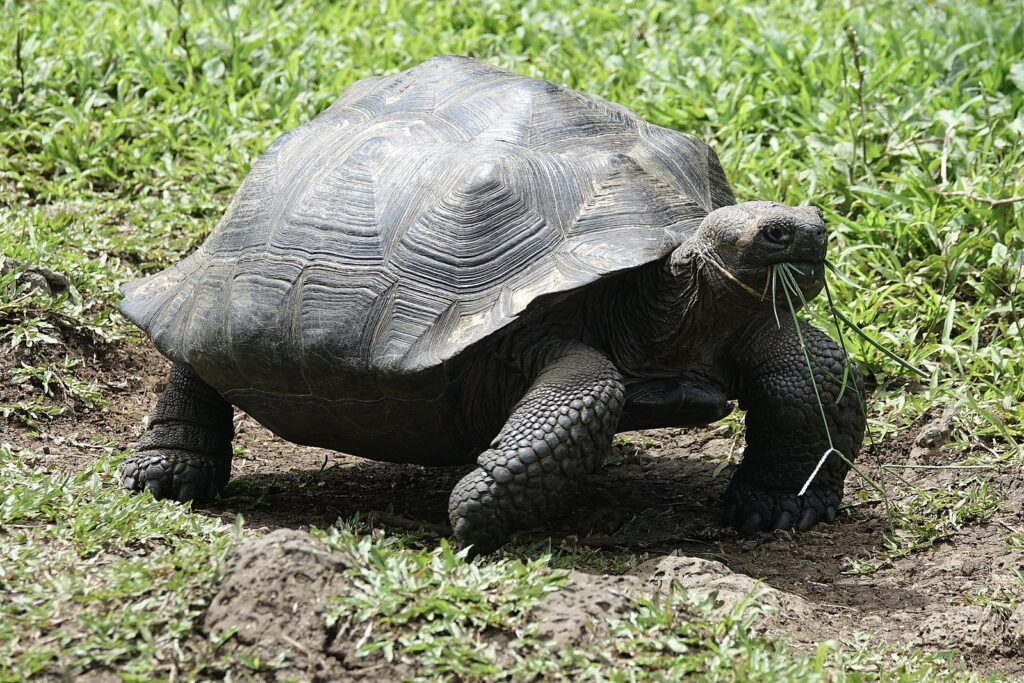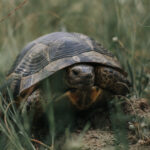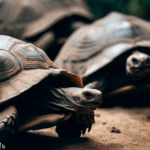
Image: Galapagos tortoise Wikimedia Commons CC 2.0
Zucchini and tortoises? Yes, they can actually be a healthy combination! This nutritious vegetable provides essential vitamins and dietary fiber, and its soft texture makes it easy for them to eat. But, it’s important to prepare it correctly.
- Wash the zucchini, cut it into small pieces, and avoid adding any oils or spices.
- It’s also important to incorporate other vegetables and greens into their diet to ensure a balanced meal. For example, kale, collard greens, dandelion greens, and turnip greens.
- You may opt to steam the zucchini before serving, but just make sure you don’t season it.
- Lastly, consult with a reptile veterinarian or research your tortoise species’ dietary needs before introducing new foods.
Key Takeaways
- Tortoises can eat zucchini as part of their diet.
- Zucchini is a good source of hydration for tortoises due to its high water content.
- It is important to feed zucchini in moderation to avoid overfeeding and potential digestive issues.
- Zucchini should be offered as a supplement to a balanced diet that includes a variety of vegetables and leafy greens.
- It is recommended to chop or grate the zucchini into small pieces to make it easier for tortoises to eat.
- Always ensure that the zucchini is fresh and free from any pesticides or chemicals before feeding it to tortoises.
- Regularly monitor the tortoise’s health and behavior to ensure that the zucchini is being tolerated well.
- Consult a veterinarian or reptile specialist for specific dietary recommendations for your tortoise species.
Can Tortoises Eat Zucchini?
Zucchini can be a great addition to tortoises’ diets. It provides essential vitamins and minerals, plus it’s full of water to keep them hydrated. But moderation is key – too much can cause digestive issues!
Here’s the lowdown on zucchini’s nutritional value:
| Nutrient | Amount/100g |
|---|---|
| Vitamin A | 200 IU |
| Vitamin C | 17.9 mg |
| Calcium | 16 mg |
| Iron | 0.4 mg |
These nutrients are essential for tortoise health. Still, zucchini shouldn’t replace staple foods – like leafy greens and grasses. Instead, think of it as an occasional treat or supplement.
So, how can you give your tortoise the zucchini boost? Here’s the top 3:
- Slice or grate raw zucchini and mix with other veggies in their regular salad.
- Cooked zucchini can be offered too, but no salt or seasonings!
- If they like soft textures, steam or blanch the zucchini first.
Pay attention to your tortoise’s consumption and behavior. If you see any adverse reactions or digestive issues, call the vet ASAP!
Benefits and Nutritional Value of Zucchini for Tortoises

To understand the benefits and nutritional value of zucchini for tortoises, dive into its sub-sections that provide high water content and hydration, a rich source of vitamins and minerals, and low calories combined with high fiber. Discover the reasons why adding zucchini to your tortoise’s diet can be beneficial for their overall health and well-being.
High Water Content and Hydration
Zucchini is a water-rich veggie – the perfect addition to a tortoise’s diet! Its 95% water content helps to keep the reptiles hydrated. Plus, it contains essential vitamins and minerals that support their health.
For maximum benefits, offer fresh zucchini slices as part of their daily diet. The moisture from the zucchini will contribute to their hydration needs while providing them with necessary nutrients. Be sure to remove any uneaten portions promptly to maintain cleanliness in the enclosure.
So, provide your shelled friend with some zucchini for optimal hydration and nutrition! It’s like a natural multi-vitamin for the slow and steady.
Rich in Vitamins and Minerals
Zucchini – a powerhouse of vitamins and minerals – is the perfect food for tortoises. Its vibrant green hue and unique flavor make it a visual and tasty delight! This veggie is also packed with essential nutrients that contribute to a tortoise’s health.
Vitamin C for immunity: Zucchini contains plentiful Vitamin C, which is vital for boosting a tortoise’s immune system and promoting healthy skin and shell growth.
Vitamin A for eyesight: This veggie is also abundant in Vitamin A, which helps with good eyesight and strong bones and shells.
Mineral Powerhouse: Zucchini contains calcium, magnesium, potassium, and phosphorus – all of which are essential for a healthy tortoise. Calcium keeps bones and shells strong, while magnesium and potassium regulate bodily functions. Phosphorus helps with energy production and metabolism.
Plus, zucchini is low calorie, so it won’t weigh your tortoise down! Introducing it into their diet gives them variety and health benefits.
Make sure your tortoise gets all the goodness of zucchini – start adding it to their diet today! They’ll thank you with improved immunity, vision, bones, and overall vitality. Enjoy the power of zucchini and see the positive effect it has on your tortoise’s wellbeing!
Low in Calories and High in Fiber
Zucchini is a great choice for tortoises! It’s low in calories and high in fiber, plus it has essential nutrients such as vitamin C, A, potassium, and manganese. Plus, its high water content helps keep them hydrated. Chewing on zucchini helps wear down their beak, promoting dental health. And, it can be served raw or cooked to add variety to their meals. Just make sure to wash it thoroughly before serving.
Adding zucchini to your tortoise’s diet can prevent boredom, reduce nutrient deficiencies, and provide them with a well-rounded diet. So, don’t miss out on the benefits of zucchini! Preparing it is easy – just slow and steady.
Preparing Zucchini for Tortoises
To ensure that your tortoises can safely consume zucchini, it’s important to know how to prepare it. In order to properly prepare zucchini for tortoises, follow these sub-sections: washing and cleaning, cutting and slicing, and deciding whether to cook it or feed it raw. Let’s delve into each of these steps to provide the solution you need.
Washing and Cleaning
Wash and clean your zucchini for your tortoises! It’s essential for their health. Here are the steps to do it:
- Step 1: Rinse the zucchini under running water.
- Step 2: Gently scrub it with a vegetable brush.
- Step 3: Remove any dirt or debris.
- Step 4: Cut off both ends.
- Step 5: Slice it into pieces.
Choose organic zucchini when you can. Wash it just before feeding to get the most nutrition.
A story: Lisa, a tortoise owner, found a caterpillar in a zucchini she had washed. Even organic produce can sometimes have unexpected surprises.
Follow these steps to give your tortoises clean and safe zucchinis. And when cutting and slicing, remember: slow and steady wins the race – unless you’re a zucchini!
Cutting and Slicing
- Grab a sharp knife and slice the zucchini into bite-sized pieces. Make sure they are the right size for your tortoise to handle.
- Remove any seeds or tough skin before slicing. Smaller pieces are easier to eat and digest. Don’t forget to wash it first, as pesticides or dirt can harm your pet.
- Try different shapes and sizes for variety. Long thin strips? Or small round pieces? See what your tortoise likes.
- The story of Sheldon shows that even at first, they will eventually learn to love zucchini. So don’t be afraid to give it a try.
- Your tortoise will be thankful for the effort! Just remember, they prefer their zucchini with a side of slow culinary despair.
Cooking or Feeding Raw?
Cooking or raw feed – that’s the essential question when feeding zucchini to tortoises. Let’s explore the options and find the best approach.
Pros & Cons:
- Cooking: Softens texture, easier digestion, reduced risk of bacterial infection. Cons: Nutrient loss due to heat, potential water loss, time-consuming process.
- Raw: Maximum nutrient content, natural hydration, provides enrichment in chewing. Cons: Tougher texture, harder to digest, higher risk of bacterial contamination.
Suggestions:
- Cooked Zucchini: Steaming or boiling is best. No seasonings or oils.
- Raw Zucchini: Thoroughly wash and slice into manageable pieces.
Conclusion:
Whatever the choice, zucchini offers essential nutrients and hydration. Feeding Guidelines: Don’t let your tortoise overeat – too much zucchini means missing out on all the drama.
Feeding Guidelines for Tortoises

To ensure proper nutrition for your tortoise, it is essential to understand the feeding guidelines. In order to provide the best care, feed your tortoise zucchini appropriately, considering their age and size. Pay attention to the frequency and portion size of the zucchini intake. Lastly, monitor your tortoise’s reaction for any signs of discomfort or adverse effects.
Age and Size Considerations
Tortoises need specific diets depending on their age and size. Ensure their growth and health with these feeding guidelines!
For hatchlings, provide small portions of quality commercial food, plus fresh leafy greens and veggies.
As they turn into juveniles, offer a more balanced diet with leafy greens, veggies, fruits, and occasional protein sources like insects.
Adults should eat mainly fibrous vegetation like dandelion greens, collard greens, and kale. Avoid too much fruit or protein-rich foods.
For tailored advice, speak to a reptile vet about your tortoise breed and characteristics.
Provide the best care for your shelled companion – follow these guidelines and give them a thriving environment!
Frequency and Portion Size
Feeding Guidelines for Tortoises
Ensuring a balanced diet and good health for tortoises requires the right frequency and portion size. Here’s a breakdown:
| Species | Frequency | Portion Size |
|---|---|---|
| Greek Tortoise | Daily | A plateful of veg & leafy greens |
| Hermann’s Tortoise | Every other day | A handful of edible flowers, weeds & herbs |
| Sulcata Tortoise | 2-3 times/week | A pile of grass, hay & cactus pads |
Overfeeding a tortoise is like my reaction to a buffet – slow and regretful.
Monitoring Tortoise’s Reaction
To monitor a tortoise’s reaction, observe its behavior after feeding. Look for signs such as increased activity. This can indicate satisfaction and energy. Also, watch for decreased activity. This could point to digestive or health issues. Additionally, bumps or cracks in the shell may mean a lack of proper nutrition. No interest in food could also indicate digestive problems.
Moreover, check the tortoise’s stool for any irregularities. Abnormalities like diarrhea or constipation may show a diet issue. Therefore, it is essential to be aware of signs to ensure the well-being of your tortoise.
To ensure a healthy tortoise, provide a balanced and varied diet. Offer leafy greens, vegetables, fruits, and occasional protein sources like worms. Furthermore, offer a calcium-rich supplement for optimal shell health. Regular veterinary check-ups can detect underlying issues early on.
By closely monitoring your tortoise’s behavior, you can make sure they stay healthy. Expand your tortoise’s culinary horizons with a variety of recommended foods. After all, why should they be the only ones to enjoy a varied diet?
Other Recommended Foods for Tortoises
To ensure a diverse and balanced diet for your tortoise, explore the realm of other recommended foods. Leafy greens, herbal options, and the importance of variety and balance in a tortoise’s diet will be discussed in this section. Discover how incorporating these options can enhance your tortoise’s overall nutrition and well-being.
Leafy Greens
Leafy greens are great for tortoises’ health and well-being. They provide vital vitamins and minerals for growth and development. Here’s a list of recommended leafy greens and their nutritional value:
| Leafy Greens | Nutritional Value |
|---|---|
| Dandelion | High in calcium, phosphorus and vitamin A |
| Collard Greens | Rich in vitamin K, vitamin C and calcium |
| Mustard Greens | Contains vitamins A, E, C and folate |
| Kale | Excellent source of vitamins K, A and C |
| Turnip Greens | High in vitamin K, calcium and folate |
These greens should only be fed in moderation. A balanced diet with lots of different greens is the best way to give your tortoise all the nutrients they need. Escarole and endive are other leafy green options you can add to their diet. Make sure you do your research before introducing any new green to make sure it meets their dietary needs.
Toby the Russian tortoise is an example of the importance of leafy greens. He suffered from shell deformities due to lack of proper nutrition. But once his owner added more variety to his diet with leafy greens, and got regular vet care, Toby’s shell improved and he grew into a healthy adult.
Proper nutrition is key to keeping your tortoise healthy and happy. Leafy greens provide essential nutrients, and make meals more interesting. So don’t forget to feed your slowpoke some herbs – they deserve a little ninja-style spice!
Herbal Options
Herbal options for your tortoise’s diet can provide more health benefits and variety. Consider adding these nutrient-rich herbs to their meals:
- Dandelion
- Plantain
- Hibiscus
- Mulberry Leaves
These offer unique qualities that will give them the nutrition they need. Include them to enhance their overall well-being. Don’t miss out on the opportunity to optimize your pet’s health! Eating like a tortoise may be slow, but with variety and balance, they can have a tasty adventure!
Variety and Balance in Tortoise Diet
It’s key to feed tortoises a balanced and varied diet, to keep them healthy. To replicate their natural diet, offer a wide variety of foods. Here’s the lowdown:
- Veggies: Kale, dandelion greens and collard greens provide essential nutrients like calcium and vitamin A.
- Fruit: Feed fruits like berries, melons and apples for additional vitamins and minerals. But, don’t overdo it – too much sugar!
- Herbs: Parsley and cilantro can help with digestion and add flavor.
- Calcium: Cuttlebone or reptile calcium supplements are vital for shell growth and maintenance.
For added nutrition, try these:
- Flowers: Edible flowers like hibiscus and pansies are a great treat. They add color and nutrients.
- Hay or Grasses: These provide fiber for digestion and teeth health.
- Insects: Mealworms and crickets can make up a natural source of protein. But, only once a week!
By including these foods, you’ll be promoting your tortoise’s wellbeing. Consult a vet for dietary advice based on your tortoise’s species and needs. My Russian tortoise loved dandelion greens! He escaped one day and found a patch of them. This reminded me of how important variety is and that they should be able to express their natural instincts. So, why not give them an adventure and let them go down the avocado rabbit hole?
Potential Risks and Caution
To ensure the well-being of your tortoise when it comes to consuming zucchini, understanding the potential risks and exercising caution is crucial. Delve into the sub-sections on allergies or digestive issues and overfeeding and its consequences for a comprehensive understanding of the various considerations associated with feeding zucchini to your tortoise.
Allergies or Digestive Issues
Allergies: Allergic reactions are varied. From mild to life-threatening. Itching, hives, swelling, difficulty breathing, even anaphylaxis. Identifying the allergens and avoiding them is key.
Digestive Issues: Abdominal pain, bloating, diarrhea, constipation. Balancing diet and seeking medical help is important.
Impact on Overall Health: Unmanaged allergies or digestive issues can have a huge effect on quality of life. Nutrient deficiencies, malabsorption, weight loss/gain, low energy, mental health problems.
Furthermore, some individuals may have both allergies and digestive issues. A NIAID study revealed 32 million Americans have food allergies. This shows how widespread allergies are.
It is essential to understand the risks of allergies/digestive issues. This will help make informed decisions about dietary choices and seek professional help when needed. Taking steps to manage these conditions will lead to better wellbeing.
Overfeeding and Its Consequences
Weight Gain: Overfeeding can cause too many calories, leading to weight gain.
Obesity: Overeating regularly can cause obesity, which brings health risks.
Cardiovascular Problems: Overeating can put a strain on the heart, raising the risk of heart diseases.
Metabolic Disorders: Eating too much can disrupt the body’s metabolic processes, possibly leading to diabetes.
Digestive Issues: Overeating can lead to discomfort and digestive problems in the digestive system.
Nutritional Imbalance: Eating more than needed can cause a lack of essential nutrients.
It’s important to be aware that overfeeding affects individuals and society. Healthcare may have to bear the cost of treating obesity-related conditions.
To avoid these risks, portion control is vital for a healthy diet. Tune into your body’s hunger and fullness cues to regulate food intake. Mindful eating can help you savor each bite and be present when eating. Exercise can help with well-being and burn calories.
Remember to be mindful of what you eat to avoid overfeeding and its consequences. Being conscious of your dietary choices and their effect is important for your health and society’s health.
Frequently Asked Questions
Q: Can tortoises eat zucchini?
A: Yes, tortoises can eat zucchini. It is a safe and nutritious food option for them.
Q: Is it okay to feed tortoises raw zucchini?
A: Yes, tortoises can eat raw zucchini. Just make sure to wash it thoroughly before serving.
Q: How should I prepare zucchini for my tortoise?
A: You can serve zucchini to your tortoise in small, bite-sized pieces. Some tortoises prefer it sliced, while others may enjoy it grated.
Q: Can zucchini be a regular part of a tortoise’s diet?
A: Zucchini can be included as part of a balanced diet for tortoises. However, it should not be the sole food source and should be given in combination with other vegetables and leafy greens.
Q: Are there any risks associated with feeding zucchini to tortoises?
A: Zucchini is generally safe for tortoises to eat. However, excess consumption may cause digestive issues such as diarrhea. It is important to feed zucchini in moderation.
Q: Can tortoises eat the skin and seeds of zucchini?
A: Tortoises can eat the skin and seeds of zucchini, but it is advisable to remove the seeds as they can be a choking hazard.
Conclusion
Can tortoises eat zucchini? Yes they can! It’s a healthy food choice, rich in water and fiber. But remember to only give it as a treat, not as a main meal. Plus, make sure to wash it thoroughly first, as pesticide residue on the skin can be harmful.
Additionally, consult with a reptile care vet to make sure your pet’s dietary needs and restrictions are met.
References




